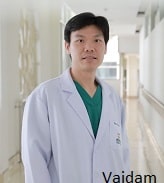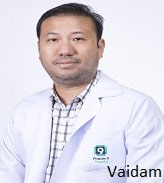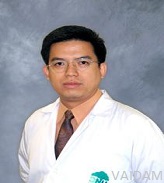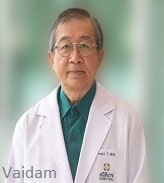Cervical Spine Surgery is generally performed to treat nerve and spinal cord impingement or for spinal instability.
The Cervical Spine Surgery procedure involves an incision in the throat area to reach and remove the disc. A graft is inserted to fuse the bones above and below the disc.
It is an elective procedure done for reasons including -
Listing approximate price of Cervical Spine Surgery and some related procedures. The prices may change depending upon the centers and condition of the patient.
| Treatment name | Cost range |
|---|---|
| Cervical Spine Surgery | USD 4500 to USD 5500 |
| Spine Decompression Surgery | USD 9000 to USD 11000 |
| Anterior Cervical Discectomy | USD 9000 to USD 11000 |
| Anterior cervical discectomy and fusion (ACDF) | USD 8127 to USD 9933 |
| Anterior Cervical Corpectomy Spine Surgery | USD 9000 to USD 11000 |
| Anterior Cervical Corpectomy Spine Surgery | USD 9000 to USD 11000 |
As a thumb rule, tests such as an MRI scan, CT scan, X-ray, myelogram, and discogram are done to evaluate your condition before the surgery. A bone scan, cardiac evaluation, and appropriate blood tests are also done. The cost for these tests is a part of the package.
Over-the-counter medications such as Motrin, Advil, or Ibuprofen can be consumed for pain-relieving as needed. Medications given at the hospital to prepare for the surgery are a part of the package price. However, once you are discharged, the medicines you buy will not be included in the package.
Cervical spine surgery generally takes approximately 3 to 4 hours and you will be required to stay in the hospital for at least one-night post the surgery.
For patients planning to travel abroad it is useful to know the price in destinations popular with medical travellers. The price for Cervical Spine Surgery in different countries is approximately:
The right doctor to consult for Cervical Spine Surgery is an Orthopedic and Spine Surgeon.
Listing popular specialists:

Consultant, 29 years of experience

Radiosurgery in Neurosurgery Full-endoscopic Operations of the Lumbar, Thoracic and Cervical Spine

Consultant, 25 years of experience

Epilepsy Surgery Functional Neurosurgery

Consultant, 30 years of experience

Kyphoplasty Vertebroplasty Discectomy Spinal laminectomy/spinal decompression Foraminotomy Nucleoplasty

Assoc. Prof. Dr. Areesak Chotivichit
Associate Professor, 39 years of experience

Arthroplasty, Spine surgery

Assist. Prof. Dr. Peerapong Montriwiwatchai
Professor, 27 years of experience

Spine Surgery

Consultant, 32 years of experience

Degenerative disc disease, Herniated disc, Spinal stenosis, Spondylosis, Vertebroplasty, Kyphoplasty, Spinal laminectomy, Discectomy, Foraminotomy

Consultant, 21 years of experience

Vertebroplasty Degenerative disc disease Herniated disc Spinal stenosis Spondylosis Vertebroplasty Kyphoplasty Spinal laminectomy Discectomy Foraminotomy Nucleoplasty Spinal fusion Artificial disk replacement

Consultant, 43 years of experience

Degenerative disc disease Herniated disc Spinal stenosis Spondylosis Vertebroplasty Kyphoplasty Spinal laminectomy Discectomy Foraminotomy Nucleoplasty Spinal fusion Artificial disk replacement

Consultant, 21 years of experience

Adult Reconstructive Spinal Surgery

Consultant, 18 years of experience

Spine surgery

Consultant, 15 years of experience

Cervical Spine Surgery, Spine Oncology Surgery

Consultant, 26 years of experience

Kyphoplasty, Vertebroplasty, Spinal laminectomy/decompression, Discectomy, Foraminotomy, Nucleoplasty, Spinal fusion, Artificial disk replacement

Prof. Emeritus Charoen Chotigavanich
Professor, 60 years of experience

Orthopaedic Spine Surgery

Professor, 47 years of experience

Spine Surgery

Senior Consultant, 36 years of experience

Spine Surgery

Gp. Capt. Dr. Tayard Buranakarl
Senior Consultant, 32 years of experience

Spine Surgery.

Senior Consultant, 21 years of experience

Spine Surgery.

Senior Consultant, 26 years of experience

Spine Surgery

Consultant, 15 years of experience

Total joint replacement Arthroplasty

Consultant, 15 years of experience

Minimally invasive spine surgery
The success rate for Cervical Spine Surgery varies between 60-74%.
Possible risks after Cervical Spine Surgery may include -
Our Services for Cervical Spine Surgery in Thailand
Transparent - Professional - Without Hassles
There are three types of surgeries, Open, Minimally invasive and Robotic surgery or robot-assisted surgery which allows doctors to perform many types of complex procedures with more precision, flexibility, and control than is possible with conventional techniques. The type of surgery on the patient depends upon the case.
Once the nerves are getting compressed and the spine is unstable, there are some symptoms that eventually start appearing such as - loss of urine and stool control, sharp pain while walking which in the extreme case can lead to paralysis.
If the patient is doing surgery once these symptoms have started appearing, some of these changes in the body are irreversible. Hence, once the diagnosis is made, the patient shouldn't wait unnecessarily for the surgery.
It is between 95-97%.
50-year life expectancy.
Spine surgeries have become extremely safe since the onset of the latest techniques like Neuronavigation. Even then the risk to life is less than 1 % and the chances of surgery to fail will be between 2 - 5%.
Spine surgeries have become extremely safe since the onset of the latest techniques like Neuronavigation. Even then the risk to life is less than 1 % and the chances of surgery to fail will be between 2 - 5%.
Cervical spine surgery is recommended to get relieve from neck pain, numbness, tingling or weakness in the neck and to restore the nerve function and to stop or prevent the abnormal motion in your neck. This surgery is being done to treat either nerve or spinal cord impingement and spinal instability.
Cervical spine surgery is indicated to treat different types of spinal neck problems, this surgey may be done to treat different types of degenerative disorders such as trauma or instability which may produce pressure on the spinal cord or on the nerves coming from the spine.
Cervical spine surgery is being used to treat various disorders such as degenerative disc disease, (discs or cushion pads between your vertebrae shrink causing wearing of the disc) and cervical deformity (for straightening and stabilizing the spine)
Yes, cervical spine surgery is a major surgery it involves fusion of the two adjacent vertebrae in the cervical spine as this procedure is very safe this is still a major surgery.
1-2 hours.
You may stay in the hospital for about 4-5 days generally
It will take around four to six hours to do cervical spine surgery.
The cervical spine is approached either from the front or from the back, mostly anterior approach is being favoured for cervical spine surgery because it result in less disruption of the normal musculature and it is also being easier for maintaining the normal alignment of spine. An anterior discectomy and fusion is the most common method for cervical spine surgery. During the surgery, the disc is removed through a small incision in the front of the neck. The cervical spine can either be approached from the front or from the back.
Revision surgery are needed for correcting a deformity, the type of revision surgery depends on the type of problem you are having. The incidence of complications is being higher than seen in first time after procedure. It is more difficult to relieve pain and to restore the function of nerve in revision surgery.
By 4 to 6 weeks after lumbar fusion surgery, most patients are cleared to return to work.
As such there are no problems beacuse the patient starts playing after 6 months.
Depends upon each individual, usually a pain because of the surgery goes away in 1-2 weeks and pain from pre-surgery goes away in 3 - 6 months (in the worst case).
Yes, it will go away after the surgery.
The grip will be restored after 4-6 weeks.
The individual will start recovering from 2 weeks and can play games and resume normal routine within 4-6 months.
Yes after the duration of 6 months it is possible.
No, it will not get affected.
Some of the possible complications of the surgery includes injury to the spinal cord, nerves, esophagus, carotid artery or vocal cords, non-healing of bony fusion, instrument breakage or failyre or bone graft site pain.
The side effects of the surgery are very minimal in case of cervical spine surgery, but along with any other procedure there are number of inherent risk. A cervical fusion will limit some ability to look straight up or down by extending or flexing the neck. Patient may also experience some difficulty in swallowing or sore throat immediately after the procedure.
You should not do driving while you are taking medicines and you should not lift anything heavier for the first two weeks after surgery. You should not do any sexual activity in the first week after surgery as long as you feel comfortable.
You have to be in hospital for almost two days after surgery. Complete recovery after the surgery will take the next four to six weeks then you can do your light activities. The complete recovery after the procedure will take around two to three months.






NABH Certified Healthcare Discovery Platform
Vaidam is NABH certified healthcare discovery platform that will connect you to top-notch medical experts, hospitals, wellness options, and trusted travel partners to help identify and make the right healthcare choices.

Researched & Personalized Treatment Plan - Under One Roof
You can search for the best hospitals, read about them, view photographs of the facilities at the hospitals and the places at which the hospitals are located, and check the cost of treatment.

Quality Treatment Within Your Budget
As soon as you post an enquiry, the patient relation team will collect details from you, share them with the doctors and hospitals on Vaidam's panel, and get a personalized treatment plan. We research to get quality treatment within your budget.

Treatment to Travel
Vaidam concierge assists patients, to get medical Visa, the best airline fares and arrangements for your stay. Our concierge also helps you with daily travel, language, and food concerns. Vaidam does everything to be your perfect host. All of Vaidam’s services are free of cost to patients.

International Reach
Vaidam Health has network in 15+ countries, which includes India, Turkey, UAE, Germany, South Korea, Thailand, Malaysia, Spain.
Note: Vaidam Health does not provide medical advice, diagnosis or treatment. The services and information offered on www.vaidam.com are intended solely for informational purposes and cannot replace the professional consultation or treatment by a physician. Vaidam Health discourages copying, cloning of its webpages and its content and it will follow the legal procedures to protect its intellectual property